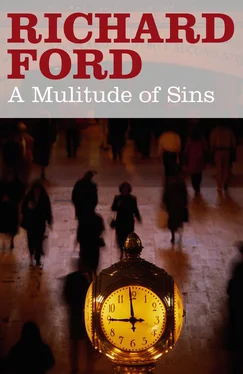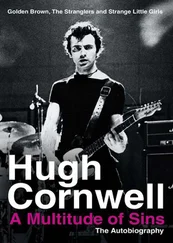Therefore, they’d kept on. Though over the intervening months their telephone conversations grew fewer and briefer. Henry went alone to Paris twice. He began a relationship with a woman in Washington, then ended it without Madeleine seeming to notice. Her thirty-third birthday passed unacknowledged. And then, just as he was planning a trip to San Francisco, Henry suggested a stopover in Montreal. A visit. It was clear enough to both of them.
The evening of his arrival, they’d eaten dinner near the Biodome, in a new Basque place Madeleine had read about. She dressed up in a boxy, unflattering black wool dress and black tights. They drank too much Nonino, talked little, walked to the St. Lawrence, held hands in the chill October night, while quietly observing the fact that without a patched-together future to involve and distract them, life became quite repetitious in very little time. But still, they had gone back to his room at the QE II, stayed in bed until one a.m., made love with genuine passion, talked an hour in the dark, and then Madeleine had driven home to her husband and son.
Later, lying alone in bed in the warm, clocking darkness, Henry thought that sharing the future with someone would certainly mean that repetitions had to be managed more skillfully. Or else it meant that sharing the future with someone wasn’t a very good idea, and he should perhaps begin to realize it.
. .
Madeleine had been crying by the window (because she felt like it), while Henry had continued getting dressed, not exactly ignoring her, but not exactly attending to her either. She had rearrived at ten to drive him to the airport. It was their old way when he came to town for business. She wore fitted blue corduroys under a frumpy red jumper with a little round white collar. She was gotten up, Henry noticed, strangely like an American flag.
In the room now neither of them ventured near the bed. They had coffee standing up, while they passed over small office matters, mentioned the fall weather — hazy in the morning, brilliant in the afternoon — typical for Montreal, Madeleine observed. She looked at the National Post while Henry finished in the bathroom.
It was when he emerged to tie his tie that he noticed Madeleine had stopped crying and was studying down twelve stories to the street.
“I was just thinking,” she said, “about all the interesting things you don’t know about Canada.” She had put on a pair of clear-rimmed glasses, perhaps to hide that she’d been crying, and that were otherwise intended to make her look studious. Madeleine’s hair was thick and dark-straw-colored, and tended to dry unruliness, so that she often bushed it back with a big silver clip, as she’d done this morning. Her face was pale, as if she’d slept too little, and her features, which were pleasing and soft with full expressive lips and dark, thick eyebrows, seemed almost lost in her hair.
Henry went on tying his tie. Out in the cityscape beyond the window was a big, T-shaped construction crane, the long crossing arm of which appeared to exit both sides of Madeleine’s head like an arrow. He could see the little green operator’s house, where a tiny human was visible inside, backed by the light of a tiny window.
“All the famous Canadians you’d never guess were Canadians, for instance.” She didn’t look at him, just stared down.
“ Par exemple? ” This was as much French as he knew. They spoke English here. They could speak English to him. “Name one.”
Madeleine glanced at him condescendingly. “Denny Doherty, of the Mamas and the Papas. He’s from Halifax. Donald Sutherland’s from the Maritimes someplace. P.E.I., I guess.”
Madeleine appeared different from how she actually was — a quality he always found strangely titillating, because it made her unreadable. Generally people looked how they were, he thought. Prim people looked prim, etc. Madeleine looked like her name implied, slightly old-fashioned, formal, settled, given to measuring her responses, to being at ease with herself and her character assessments.
But in fact she was nothing of the kind. She was a strong farm girl from north of Halifax herself, had been a teenage curling champion, liked to stay up late having sex, laughing and drinking schnapps, and could sometimes be quite insecure. He thought this incongruity was a matter of their ages (he was sixteen when she was born), and that other people who knew her didn’t find it incongruous at all. In general, he thought, younger people were more accepting now, Canadians especially. He would miss that.
Madeleine mused back out the window at the cars lined along the side of the Cathedral Marie-Reine-du-Monde. “It’s hazy to be flying,” she said. “I’d rather just stay here.”
It was eleven. The breakfast tray sat on the disheveled bed, on top of the scattered newspapers. Henry liked the Canadian papers, all the stories about things going wrong that he didn’t have to care about.
Henry Rothman was a large bespectacled man, who when he was young had looked — and he’d agreed — like the actor Elliott Gould in his role in Bob & Carol & Ted & Alice , though he’d always felt he was more light-hearted than the character Elliott Gould had played — Ted. Rothman was a lawyer as well as a lobbyist, and represented several big firms that did business all over the world. He was a Jew, just like Elliott Gould, but had grown up in Roanoke, gone to Virginia then Virginia Law School. His parents had been small-town doctors who now lived in Boca Grande where they were by turns ecstatic and bored in a condominium doing nothing. Henry practiced in a firm that included his two brothers, David and Michael, who were litigators. He had been divorced ten years, had a daughter living in Needham, Mass., teaching school.
Madeleine Granville knew all about the cost of things: fertilizer, train transport, container ships full of soybeans, corn; she understood futures, labor costs, currency, the price of money. She’d studied economics at McGill, spoke five languages, had lived in Greece and had dreamed of being a painter until she met a handsome young architect on a train from Athens to Sofia, and quickly married him. They’d settled in Montreal where the architect had his practice and where they liked it fine. To Rothman it seemed young, heady, exciting, but also savvy, solid, smart. He liked it very much. It seemed very Canadian. Canada, in so many ways, seemed superior to America anyway. Canada was saner, more tolerant, friendlier, safer, less litigious. He had thought of retiring here, possibly to Cape Breton, where he’d never been. He and Madeleine had discussed living together by the ocean. It had become one of those completely transporting subjects you give your complete attention to for a week — buying maps, making real estate inquiries, researching the average winter temperature — then later can’t understand why you’d ever considered it.
In truth Rothman loved Washington; liked his life, his big house behind Capitol Hill, his law-school chums and his brothers, the city’s slightly antic, slightly tattered southernness, his poker partners, his membership at the Cosmos Club. His access. He occasionally even had dinner with his ex-wife, Laura, who, like him, was a lawyer and had remained unmarried. Who you really were, and what you believed, Rothman realized, were represented by what you maintained or were helpless to change. Very few people really got that; most people in his stratum thought everything was possible at all times, and so continued to try to become something else. But after a while these personal truths simply revealed themselves like maxims, no matter what you said or did to resist them. And that was that. That was you. Henry Rothman understood he was a man fitted primarily to live alone, no matter what kind of enticing sense anything else made. And that was fine.
Читать дальше












